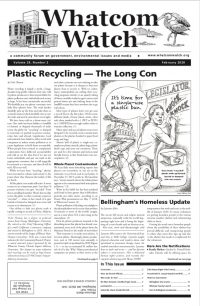Since January 2014, Whatcom Watch has been rerunning articles from issues printed 20 years ago. The below article appeared in the February 2000 issue of Whatcom Watch.
Editor’s Note: In March 1999, The Initiative Group filed an initiative with Bellingham city attorney Dawn Sturwold. It was designed to purchase undeveloped land in the Lake Whatcom watershed; approximately $4 million per year would be used for land acquisition. On July 21, 1999, the Whatcom County auditor vertified the initiative for the city of Bellingham general election ballot.
At the September 20, 1999 Bellingham City Council meeting, just weeks before the general election, they voted to pursue a lawsuit (declaratory judgment). A Superior Court judge deferred ruling on the lawsuit, saying the ruling would probably affect the election. There were 21,097 votes cast in the city election, 4,407 didn’ t vote on the initiative. Of the 16,690 ballots cast on the initiative, it lost by 226 votes.
Almost a year later, at the September 18, 2000, City Council meeting, they passed an ordinance to increase water rates by $5 to be used for land purchases and preservation projects around Lake Whatcom.
The ordinance created a Citizens’ Advisory Task Force to recommend policy for land acquisition. The task force is still functioning, and is called the Lake Whatcom Watershed Advisory Board. The 11 members are appointed by the mayor and confirmed by the City Council.
These are Mr. Watts’ own comments, and not an official city position.
by John Watts
The growing concerns about Lake Whatcom, which are now being addressed result from years of incremental misuse, ignorance of the cumulative effects of these misuses, and the inertia of short-term thinking in the surrounding watershed. To arrest our habit of careless practices and to institutionalize a long-term preservation program for this resource will require building and maintaining broad public awareness of the factual situation, and a commitment to change our collective habits and practices in a commonsensical, but comprehensive way.
The Initiative Group has earned considerable respect for their yeoman efforts in educating the public on this important issue, and by identifying a long-term funding source for land acquisition in the watershed. Their resulting public initiative, Proposition 1, narrowly missed being approved by voters, an accomplishment deserving the lasting attention of elected officials of our city and county. The message delivered by this campaign and vote will likely help achieve many of its goals over time.
However, I am concerned that this hard-earned respect, which should be celebrated as a positive accomplishment, is instead being degraded by bitter attempts to externalize the “blame” for its failure. This is unfortunate, since this seems to demonstrate residual anger, impatience, and distrust of others equally concerned with protection of our drinking water source.
Any of these negative traits could qualify as fatal flaws in such efforts, squandering the valuable motivation and momentum gained. Besides, there is enough “blame” to go around, and we all share in it to the extent these problems and their solutions have not been adequately addressed. While a certain amount of introspection is helpful to understand the lessons learned, over-indulgence can turn attitudes negative, to the detriment of the very goals we are trying to achieve.
I believe the allegations of conspiracy by the city against the goals of this initiative are false and misleading, and they do great disservice to our public servants and citizens alike. If real evidence of illegality exists, then it should be presented through legal channels, not through innuendo in the press.
These allegations certainly do not square with the priorities expressed during and subsequent to the City Council’s 1999 annual retreat, where the protection of the Lake Whatcom drinking water supply was the unanimous, number one priority.
Members of the City Council tried hard to refrain from any perceived abuse or misuse of the initiative process, to the point we felt hamstrung from even speaking about it except when answering direct questions. After certification, we did offer The Initiative Group a public invitation (which was accepted) to develop a ballot alternate (not a substitute), but this attempt failed, despite concentrated efforts by The Initiative Group supporters and council members.
The City Council’s decision to seek a declaratory judgment on the validity of Proposition 1 seemed necessary, with only the timing in question. We opted to request it before the vote because we felt citizens would prefer to know our intentions prior to voting. Either way, criticism was expected in what proved to be a bad year for local government, with I-695 (the first Tim Eyman initiative to lower car tab fees to $30), the Olympic pipeline disaster, and several other contentious issues appearing in close succession.
The real irony here is that no public vote would have been required had The Initiative Group and the City Council been able to collaboratively develop workable goals, which could have been approved as an ordinance, with the understanding that public process would determine the details. That option remains a possibility, notwithstanding the impacts of I-695.
Despite the missed opportunities experienced in this process, I hope that The Initiative Group and other concerned groups and individuals will continue to help us push for progress toward a more comprehensive program for the Lake Whatcom Reservoir. A big advantage we have this year is an increased public awareness of the need to preserve our drinking water source, and this has been largely due to The Initiative Group’s efforts. Let’s not lose sight of our primary goal of sustaining our precious resource through positive changes resulting from this public awareness. I believe this cause is too important to allow petty differences to distract us. Let’s get on with moving steadily forward to attain some lasting solutions — together!
_______________________________
John Watts represented the third ward on the Bellingham City Council from December 1998 until December 2007. When this article was written he was chair of the Lake Whatcom Watershed Committee.




























